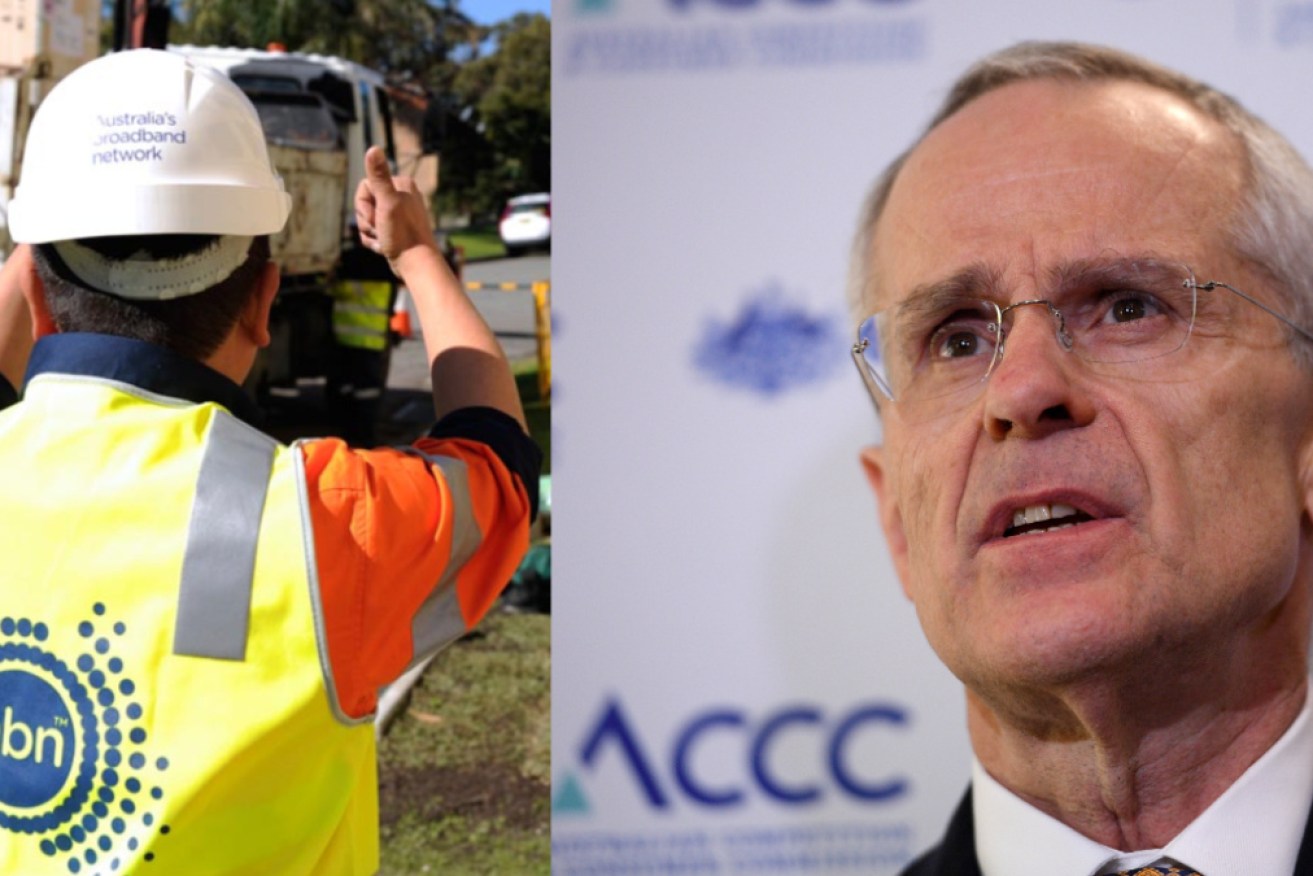NBN ‘holding up well’ as coronavirus causes internet traffic surge, ACCC says


The NBN's performance is "encouraging", ACCC chair Rod Sims says. Photo: NBN Co/AAP
The consumer watchdog has assured Australians that the national broadband network (NBN) is coping well with the ongoing surge in traffic due to the coronavirus pandemic.
NBN data traffic is up 70 per cent during business hours, Australian Competition and Consumer Commission chair Rod Sims said on Monday.
Data from the ACCC’s Measuring Broadband Australia program shows that daytime NBN speeds “have not been impacted” and that speeds “are holding up well on most evenings”, he said in a speech delivered via Zoom.
“Average NBN speeds in last Wednesday’s busy evening period, for example, were just as good as we saw on an equivalent Wednesday in February, with performance above 80 per cent of maximum plan speeds,” Mr Sims said.
The NBN Co’s decision to temporarily ease bandwidth restrictions has paid off, he said.
“It is clear that NBN Co’s temporary boost in network capacity which allows RSPs to increase their capacity on the network by up to 40 per cent at no extra cost for three months is underpinning these encouraging results,” Mr Sims said.
Last week, the ACCC gave temporary authorisation for a working group comprising NBN Co, Telstra, Optus, Vodafone, TPG and Vocus to collaborate on implementing “unusual traffic management and capacity optimisation techniques” to keep vital services operating as NBN traffic hits all-time highs due to stay-at-home orders.
Mobile calls surge
Mobile networks are also “handling the increase in volume quite well” despite “serious issues when there was a massive increase in calls to some government numbers”, Mr Sims said.
There has been a 50 per cent increase in mobile call volumes on some routes, which appears to have impacted “a modest percentage (say, 3 to 4 per cent) of calls”, he said.
Retailers are increasing plan allowances or reducing excess charges to help their customers adjust, and they should be applauded for this.’’
However, Mr Sims said there are still concerns over some services, and stressed that telcos must help consumers without a working service get online, offer flexibility to customers, and be open with them if service restrictions are required.
“It is very important consumers receive accurate advice to guide their decisions,” Mr Sims said.
“We still expect service providers to take reasonable steps to check the capability of NBN connections where consumers look to upgrade as some are doing during this period.”
Online queues and lower streaming quality
From retailers to streaming platforms, companies are taking measures to ease online traffic congestion.
Last week, Kmart introduced queues to its e-store in an attempt to manage the increased demand for online shopping.

Kmart is trialling online queues to manage demand. Photo: kmart.com.au
The system limits the number of shoppers that can access its e-store during times of high traffic volume, with customers taken to a virtual ‘waiting room’ and given a queue number and wait time.
Mr Sims said he was “confident e-shopping will not return to pre-crisis levels”.
With more people exposed to the convenience of e-shopping, why would they revert?’’
Last month, The Guardian revealed that Communications Minister Paul Fletcher had asked popular streaming services including Netflix and Stan to reduce the quality of their videos so as not to overload the NBN.
How to get the most out of your internet connection
The speed and reliability of your internet connection will differ based on your internet provider and the type of technology used to connect you to the NBN, Flinders University technology expert Paul Gardner-Stephen explained.
Dr Gardner-Stephen outlined the following steps internet users can take to help get the best out of their connection:
- Close all applications you are not using on your device, as many of these consume surprising amounts of your internet bandwidth
- Make sure your wireless router/NBN modem is near to where you are working, and ideally up high, so that there are fewer obstructions between it and your devices
- Don’t use the microwave oven when trying to use the internet, unless it is a long way from the devices you are using and your wireless router/modem. Microwaves use the same frequencies as a lot of wireless routers (2.4GHz), which can cause interference
- If you have a FTTN (copper) connection to the NBN, think about unplugging any phones you are using. If that doesn’t help, try plugging the router or modem into different phone outlets
- If you are having online meetings, start them at weird times in the hour, instead of on the hour or half-hour, when it’s likely everyone else will be starting meetings. For example, arrange a call for 10.23 instead of 10am or 10.30am
- Download documents to work on “off line” rather than trying to edit on line, if your tasks can accommodate this
- Turn off or unplug internet-connected devices that you’re not using
- If you have kids at home, try to get them playing games that don’t need internet access, rather than, say, watching funny cat videos in UltraHD video, so that you can free up bandwidth
- Listen to music you have downloaded or have on CDs, rather than listening to streaming music services
- Reduce the video resolution when watching videos online, and disable video during online meetings, and mute your microphone when not talking. All these things will help to reduce the bandwidth
- Some browsers support a “turbo mode” that compresses data before it sends it over the internet to you. Find the control and turn it on, as this can speed up some internet tasks.








